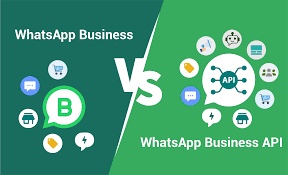In the realm of digital communication, WhatsApp has emerged as a key player, not only for personal conversations but also for business interactions. Two prominent tools within the WhatsApp ecosystem are WhatsApp Business and WhatsApp API. In this article, we will delve into the distinctions between these two offerings, exploring their features, applications, and how they cater to the diverse needs of businesses.
Understanding WhatsApp Business
WhatsApp Business is a free-to-use application designed for small and medium-sized enterprises (SMEs) to establish a presence on the platform. It provides businesses with tools to interact with customers in a more structured and professional manner compared to personal WhatsApp accounts.
Features of WhatsApp Business:
- Business Profile: WhatsApp Business allows businesses to create a dedicated profile with essential information such as business description, address, and contact details. This feature adds a layer of professionalism and helps customers identify and trust the business.
- Quick Replies: With the Quick Replies feature, businesses can create predefined responses to commonly asked questions. This not only saves time but also ensures consistent and accurate communication.
- Catalog: WhatsApp Business enables businesses to showcase their products or services through a catalog. This visual representation simplifies the browsing experience for customers who can view and inquire about products directly within the app.
- Automated Away Messages: Businesses can set up automated away messages to inform customers when they are not available to respond immediately. This feature manages customer expectations and provides assurance that their inquiries will be addressed.
- Labels: WhatsApp Business allows businesses to organize and categorize chats using labels. This helps businesses prioritize and manage their conversations more efficiently.
Applications of WhatsApp Business:
WhatsApp Business is particularly suitable for small businesses and local enterprises looking to establish an official presence on WhatsApp. It caters to businesses that primarily engage in one-on-one interactions with customers and can effectively manage their communication within the features provided by the application.
Understanding WhatsApp API:
WhatsApp API, on the other hand, stands for Application Programming Interface and is designed for larger businesses that require a more robust and integrated solution. Unlike WhatsApp Business, which is a standalone application, WhatsApp API allows businesses to integrate WhatsApp into their existing systems and applications.
Features of WhatsApp API:
- Chatbots: WhatsApp API supports the integration of chatbots, which are automated programs that can interact with customers in a conversational manner. This feature enables businesses to handle a large volume of inquiries and provide instant responses.
- Interactive Messages: Businesses can send interactive messages to customers, allowing for dynamic and engaging conversations. Interactive messages go beyond simple text and enable businesses to create more interactive and responsive communication.
- Automated Messaging Rules: WhatsApp API allows businesses to set up automated messaging rules. This feature ensures that predefined responses are triggered based on certain keywords or customer queries, streamlining communication and improving efficiency.
- Payment Links: WhatsApp API supports the integration of payment links, allowing businesses to send secure links for transactions directly through the messaging platform.
- Rich Media Support: WhatsApp API enables businesses to send a variety of media, including images, videos, and documents. This is particularly useful for businesses that need to share multimedia content as part of their communication.
Applications of WhatsApp API:
WhatsApp API is tailored for larger businesses with more complex communication needs. It is suitable for enterprises that require seamless integration with their customer relationship management (CRM) systems, e-commerce platforms, and other business applications. WhatsApp API is ideal for businesses that want to leverage automation and enhance their customer interactions on a larger scale.
Comparing WhatsApp Business and WhatsApp API:

-
Scale of Operations:
- WhatsApp Business: Best suited for small and medium-sized businesses with relatively straightforward communication needs.
- WhatsApp API: Ideal for large enterprises with a high volume of customer interactions and the need for integration with existing systems.
-
Automation:
- WhatsApp Business: Offers basic automation features such as quick replies and automated away messages.
- WhatsApp API: Provides advanced automation capabilities, including chatbots, automated messaging rules, and interactive messages.
-
Integration:
- WhatsApp Business: A standalone application with limited integration capabilities.
- WhatsApp API: Designed for seamless integration with external systems, allowing businesses to centralize communication data.
-
Media Support:
- WhatsApp Business: Primarily supports text-based communication with some basic multimedia capabilities.
- WhatsApp API: Offers robust support for various media types, enhancing the richness of communication.
-
Payment Integration:
- WhatsApp Business: Does not have built-in support for payment links.
- WhatsApp API: Allows businesses to integrate payment links, facilitating secure transactions within the messaging platform.
Choosing the Right Solution for Your Business:
When deciding between WhatsApp Business and WhatsApp API, it's essential to consider the size of your business, the complexity of your communication needs, and the level of integration required. Small and local businesses that primarily engage in direct customer interactions may find WhatsApp Business to be a sufficient and user-friendly solution.
On the other hand, larger enterprises with a significant customer base and complex communication workflows may benefit more from the advanced features and integration capabilities offered by WhatsApp API. The ability to incorporate chatbots, automated messaging rules, and payment links can significantly enhance the efficiency and effectiveness of customer interactions for such businesses.
In conclusion, both WhatsApp Business and WhatsApp API serve distinct purposes in the business communication landscape. The key is to align the choice with the specific requirements and scale of operations of your business. Whether you opt for the simplicity of WhatsApp Business or the robust capabilities of WhatsApp API, leveraging these tools can undoubtedly contribute to a more streamlined and effective communication strategy for your business.


No comments yet